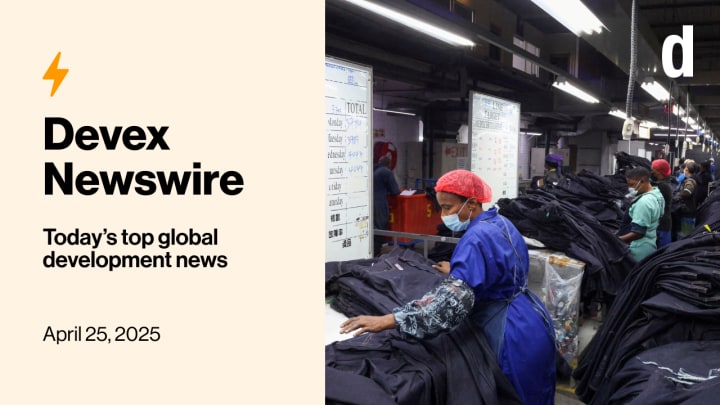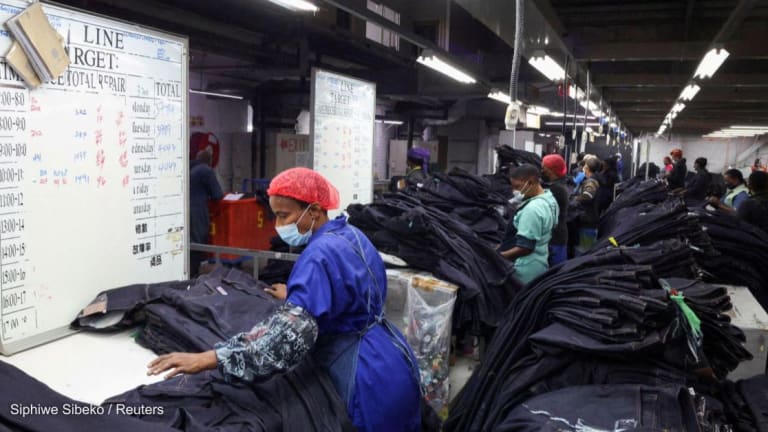
Trump-era tariffs are back, piling pressure on already debt-distressed nations. While a 90-day pause helps, export drops and currency shortages are biting. A new IMF-backed guide aims to speed up and clarify debt restructuring.
Also in today’s edition: Where World Bank funding goes, the IMF’s Kristalina Georgieva advises keeping a cool head, an update on MCC and Lobito, and reactions to the U.S. State Department shutting offices.
New playbook
This is a preview of Newswire
Sign up to this newsletter for an inside look at the biggest stories in global development, in your inbox daily.
U.S. President Donald Trump’s tariffs are back — and for debt-distressed nations, they couldn’t have come at a worse time. A 90-day pause offers a breather, but experts say the damage from all the uncertainty is already here: tanking exports, drying up foreign currency, and leaving countries scrambling to roll over their debt.
The uncertainty is likely to decrease the amount of money available in the market, which lowers the chance that creditors will allow countries to refinance their debt, a process that experts say is fundamental to debt-distressed countries.
“This is a critical aspect of debt management for any country,” says the Center for Global Development’s David Grigorian. “It’s the equivalent of being able to drive your car to your house, to have access to health care. It’s really that basic of a debt management function.” Meanwhile, countries such as Lesotho and Cambodia are slammed with up to 50% tariffs, and it's unclear what goods will be hit next.
The global debt crisis didn’t top the agenda at the World Bank and International Monetary Fund Spring Meetings, but on Wednesday, it got a procedural boost: A new guidebook for how countries can approach restructuring when their finances fall apart. The framework spells out how to assess debt sustainability, who to bring in for legal and financial advice, and when to start engaging with lenders, writes my colleague Jesse Chase-Lubitz.
IMF Managing Director Kristalina Georgieva says the plan now has widespread support. “The playbook for debt restructuring is now endorsed by everybody,” she told a Washington, D.C. audience. “It may not sound like the biggest deal, but it’s a big deal.”
The hope is that with clearer steps, more countries can move faster — and more transparently — when seeking relief. Eric LeCompte of the Jubilee USA Network praised the effort, saying it “puts more information at the hands of countries trying to get out of the debt crisis.” But he warned that the guide doesn’t go far enough: It’s “limited” and “doesn’t offer the creative thinking that we need to get to economic stability.”
Read: US tariffs threaten to push debt-distressed nations closer to the brink
+ Listen: For the latest episode of our podcast series, our reporters on the ground in Washington, D.C., Adva Saldinger and Jesse, join Business Editor David Ainsworth to discuss the uncertainty around tariffs and the latest news from the World Bank meetings.
Cool as a cucumber
The big names are telling countries to “keep a cool head,” but don’t seem to agree on how. A session on global uncertainty was unsurprisingly packed yesterday with some of the biggest names at the World Bank-IMF Spring Meetings headlining: IMF’s Georgieva, United Kingdom Chancellor Rachel Reeves, and Jörg Kukies, Germany’s finance minister.
The main takeaway came from Georgieva, who encouraged Europe to “keep a cool head.” It was clear the week was winding down, Jesse tells me. There were laughs throughout, and almost every member of the panel shared their favorite movie before explaining why it was emblematic of their financial policies.
Federico Sturzenegger, Argentina’s minister of deregulation and state transformation, referenced a line from “Star Wars.” “The fear of loss is the path to the dark side,” he said, arguing that bureaucratic overreach can stifle innovation.
Things got more serious when MIT Sloan School of Management’s Kristin Forbes, former member of the White House Council of Economic Advisers, cautioned that now might not be the time to deregulate the financial sector. “We shouldn’t deregulate more broadly, we need to pay attention to the bigger picture.”
The IMF is projecting a 30% chance of a global recession, according to its World Economic Outlook, published on Tuesday. The leaders from the U.K. and Germany said they are responding by pursuing targeted fiscal reforms to boost private sector growth, focusing on infrastructure, digital transformation, and reducing regulatory barriers.
But trade uncertainties remain a significant challenge, with participants stressing the importance of multilateral dialogue and maintaining a rules-based global trading system. Despite the bleak outlook, the talk was cheerful — underscoring a general vibe of normalcy across the bank this week.
MCC in the dark
The future of the Millennium Challenge Corporation? Still very much up in the air. And as my colleague Adva is hearing, it doesn’t look like all parts of the U.S. government are on the same page.
MCC got a budget from the White House Office of Management and Budget recently — and whether Secretary of State Marco Rubio was even looped in is unclear, according to her sources. Ambassadors posted in MCC countries weren’t told anything either, and members of Congress? Also, apparently left in the dark.
It’s not just Washington that’s in the dark and confused. MCC partner countries are scratching their heads, too. Adva questioned Zambia’s finance minister, Situmbeko Musokotwane — whose country signed a second compact with MCC in October, this time focused on agriculture.
“I’ve not yet received official information from the U.S. government about the future of the Millennium Challenge in Zambia,” he tells her, adding that there are signs the MCC office might be closed. “I think it’s important for us to receive the official information because we need to know whether the closing of the office also means that the initiatives that are started also get abandoned or whether those initiatives get transferred to other agencies.”
ICYMI: Elon Musk’s DOGE takes aim at Millennium Challenge Corporation
All aboard Lobito
Zambia’s Musokotwane is happy about one Trump administration decision: U.S. support for the Lobito Corridor, a rail and trade route linking Angola, Zambia, and the Democratic Republic of Congo to boost exports of critical minerals and create jobs, Adva tells me.
The administration is supporting the project, which is important because it supports Zambia’s main focus: jobs, he says.
The State Department tweeted Wednesday that the project aligns with making “America safer, stronger and more prosperous,” alongside a train pic that looked more like Washington, D.C, Metro than mineral freight.
Angola’s transport minister, Ricardo Viegas D’Abreu, called the U.S. backing “a very important signal of how strategic” the project is for both Africa and the global economy. “Transport and logistics infrastructure are critical for sustainability and the diversification of our economies,” he says.
State Department Africa adviser Massad Boulos met with the Africa Finance Corporation — a key Lobito developer — and expressed interest in scaling infrastructure projects on the continent. AFC CEO Samaila Zubairu says Boulos also confirmed that U.S. development finance for the project is moving forward. “That is again evidence of commitment,” he says.
Background: The Lobito corridor — a flagship Biden project’s progress and future (Pro)
Tracking billions
As the World Bank and IMF meetings wind down and foreign aid budgets are still under the knife, people want to know: Where’s all the money going? Our analyst Miguel Antonio Tamonan looks at where the World Bank’s fiscal year 2024 spending goes.
The bank awarded over 26,000 contracts last year, worth nearly $15 billion. Of that, about $1.7 billion went to consultants. And Africa led the pack by far: Eastern and Southern Africa pulled in nearly $449 million in consultancy support, while Western and Central Africa weren’t far behind with $399 million. Mozambique, the DRC, and Tanzania topped the borrower list.
Health came out as the most funded sector, with nearly $174 million, followed by transport, energy, education, and water projects. India took the crown as the World Bank’s biggest consulting supplier, scoring about $124 million across 180 contracts — including six worth $41 million for work in Nepal.
Germany and France also made strong showings, mostly through projects across Africa and the MENA region. And multilateral players grabbed some of the biggest single deals: the Pan American Health Organization bagged $53 million for its COVID-19 response in Nicaragua, while the World Food Programme picked up nearly $38 million for school meals and nutrition programs in Haiti and the Republic of Congo.
Read: Who’s winning the World Bank’s consulting contracts? (Pro)
+ Not yet a Devex Pro member? Start your 15-day free trial today to access all our exclusive reporting and analyses, data-driven funding insights, members-only events, and the Pro Insider — a Sunday newsletter that gives you a weekly head start on our industry’s big moves.
Toeing the (party) line
On Monday, the State Department dropped a bombshell: A major shake-up that would shut down over 100 offices, lay off some 15% of staff, and overhaul how foreign aid is handled. Cue instant reactions from both sides of the aisle.
Republicans were all in. “Change is not easy, but President Trump and Secretary [of State Marco] Rubio have proposed a vision to remake the State Department for this century and the fights that we face today, as well as those that lie ahead of us,” said Sen. James Risch, top Republican on the Senate Foreign Relations Committee. “I look forward to working with my colleagues in the Senate to ensure that reorganization occurs."
Democrats? Not so much. Sen. Jeanne Shaheen slammed the plan as a “slash and burn campaign” targeting both the State Department and USAID, and pledged to grill Rubio before the foreign affairs committee.
Similar story in the House of Representatives. GOP Rep. Brian Mast called the plan a way to make the department “leaner and meaner” and “ensure every dollar and diplomat puts America First.” But Rep. Gregory Meeks wasn’t having it, warning it would “eviscerate” U.S. soft power and leave the department “ill-equipped to advance U.S. national security interests.”
Both Meeks and Shaheen also blasted the lack of transparency. “Zero consultation with Congress,” said Meeks. Risch, meanwhile, argued Rubio had included “ideas that the Senate itself had put forward.”
Bottom line: with Republicans controlling both chambers, Democrats may be in for a fight — but the reorg is already gaining serious momentum.
ICYMI: State Department releases new ‘America First’ reorganization plan
Related: Reported State plan like ‘cutting your legs out from under you’
In other news
The government of the Democratic Republic of Congo and M23 rebels have agreed on a ceasefire as they continue their peace talks in Qatar. [BBC]
World Economic Forum founder Klaus Schwab and his wife are under investigation over alleged financial and ethical misconduct. [The Guardian]
Israel admitted fault in the death of U.N. aid worker Marin Marinov during a strike at a U.N. guesthouse in Gaza last month. [CNN]
Sign up to Newswire for an inside look at the biggest stories in global development.




